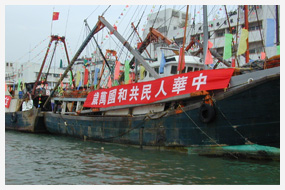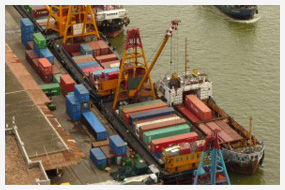Ever since Macau reversed to China in 1999, the economy of Macau became characterized by open-ness and tourism dependence. Apparel exports and gambling activities, which is also directly related to tourism, have been the major sources of revenue generation and contribute enormously to the gross national product of the country.
 Macau has scarce natural resources and it is difficult to practice farming not only due to the small size of the region, but because of lack of fertile soil. Therefore, it depends largely on mainland China for things like fresh water, food as well as energy such as electricity. Hong Kong and Japan mainly supply raw materials for the manufacture of apparel and finished goods. They also supply Macau with capital goods. Ever since Macau was given a status of special administration region by People’s Republic of China, its public security has improved by a great extent.
Macau has scarce natural resources and it is difficult to practice farming not only due to the small size of the region, but because of lack of fertile soil. Therefore, it depends largely on mainland China for things like fresh water, food as well as energy such as electricity. Hong Kong and Japan mainly supply raw materials for the manufacture of apparel and finished goods. They also supply Macau with capital goods. Ever since Macau was given a status of special administration region by People’s Republic of China, its public security has improved by a great extent.
Macau has also been granted a full membership of the World Trade Organization. Gambling has been legalized by the government of Macau. It has established a set of rules of conduct, whereby most operators are required to pay tax as part of their gambling operations. All of them factors have helped promote and strengthen Macau’s economy. Macau has also been able to introduce social welfare programs, where all Macau citizens are entitled to fee education for the first 15 years of their lives.
Even though the 1997–98 Asian financial crisis and the 2001 global downturn has an adverse effect on the economy of Macau, it picked up its speed and exceeded expectations by growing at a rate of 13.1 percent per year average during 2001 and 2006.
 As soon as the traveling restrictions from mainland China to Macau eased up, an increase in the number of visitors was seen. This led to increased public works expenditures, and the revenues that were generated from Macau’s gaming industry served as significant capital input to investments. An increase in the taxes on gambling profits generated around 70 percent of government revenue in Macau. This became part of the five-year recovery in Macau’s economy. The Macanese currency, called the pataca, is pegged to the Hong Kong dollar equals about 1.03 Macanese pataca. This is maintained by the Monetary Authority of Macao (AMCM). Therefore, the Hong Kong dollar serves as a reserve currency for the Macanese, since any upside or downside swings in the Hong Kong dollar will have an effect on the Macanese currency. The Monetary Authority of Macao is also obligated toissue and redeem pataca on demand against Hong Kong dollar. This has to be at the specified fixed rate and without limit.
As soon as the traveling restrictions from mainland China to Macau eased up, an increase in the number of visitors was seen. This led to increased public works expenditures, and the revenues that were generated from Macau’s gaming industry served as significant capital input to investments. An increase in the taxes on gambling profits generated around 70 percent of government revenue in Macau. This became part of the five-year recovery in Macau’s economy. The Macanese currency, called the pataca, is pegged to the Hong Kong dollar equals about 1.03 Macanese pataca. This is maintained by the Monetary Authority of Macao (AMCM). Therefore, the Hong Kong dollar serves as a reserve currency for the Macanese, since any upside or downside swings in the Hong Kong dollar will have an effect on the Macanese currency. The Monetary Authority of Macao is also obligated toissue and redeem pataca on demand against Hong Kong dollar. This has to be at the specified fixed rate and without limit.
100 avos make up 1 pataca. 10, 20, and 50 avos coins are issued. 1, 2, 5 and 10 patacas coins are also issued and notes are available in 5, 10, 20, 50, 100, 500, and 1000 patacas. In addition to the local currency of Patacas, the Hong Kong dollar and the Chinese yeh are also widely accepted and used in Macau.

